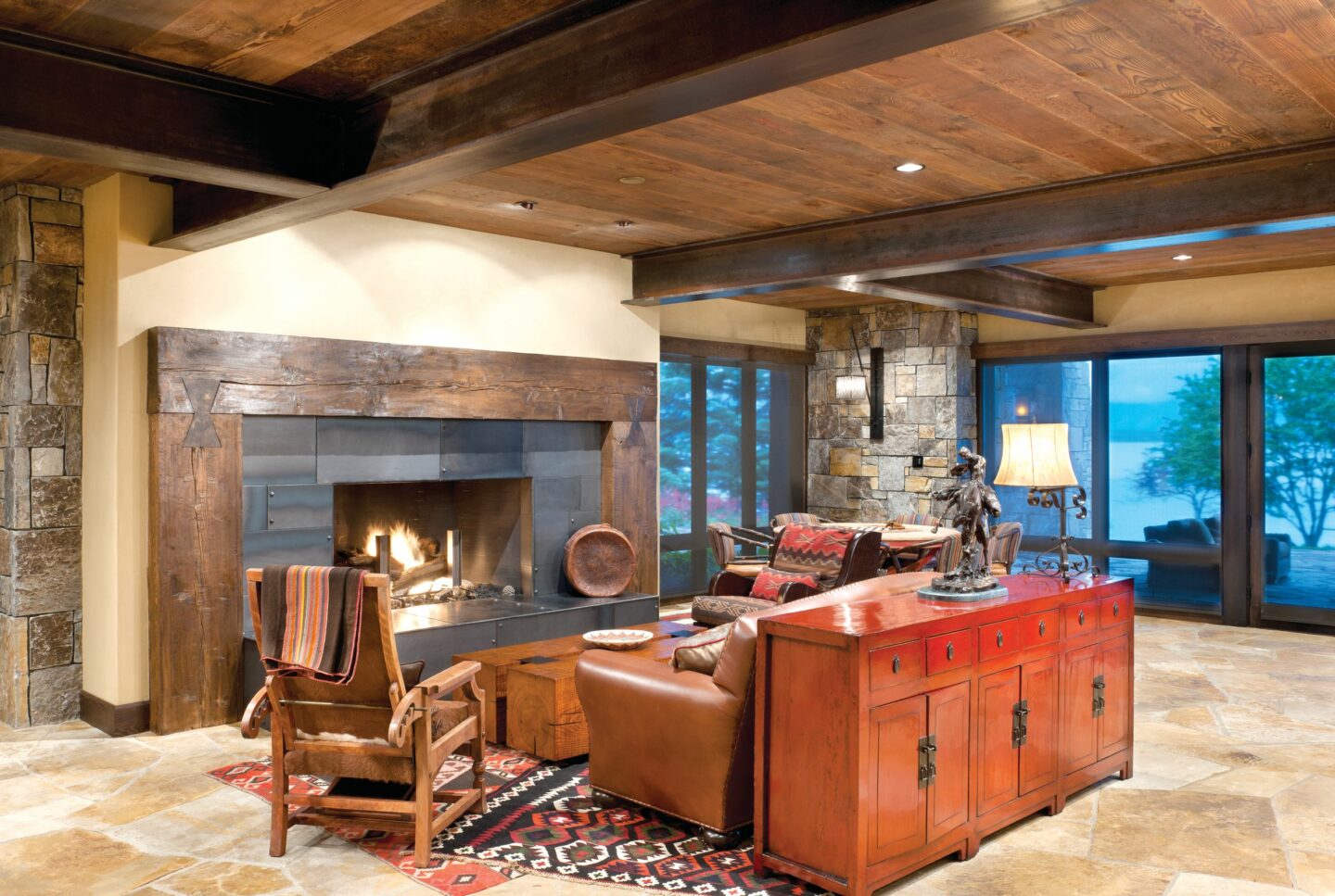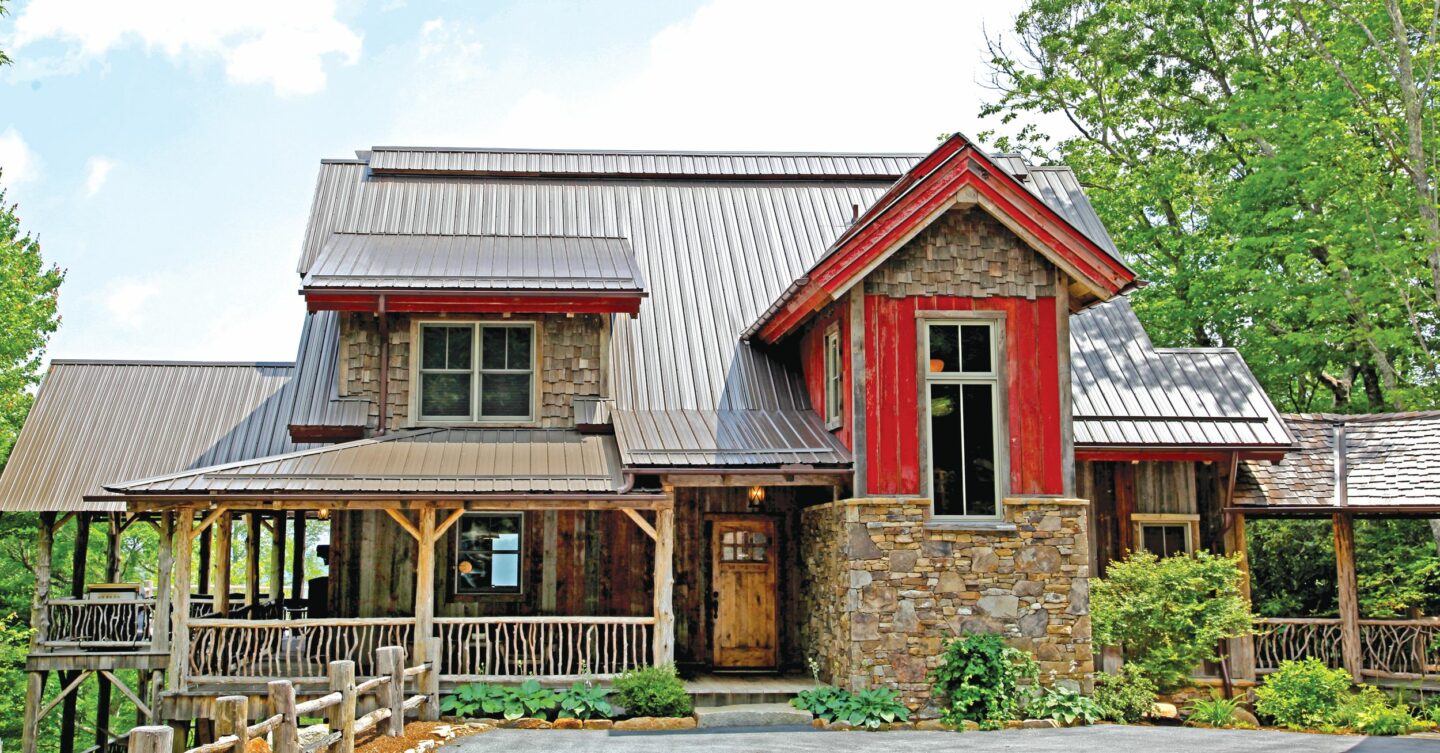Assembling a team of experts to help you design and build your home is the key to fulfilling your needs and wants.
Sam and Gale Easter, self-described “loggies,” are enthusiastic about living in the log home of their dreams. But during the planning stages for the house, the couple took time to carefully research log home companies and builders. They were looking for professionals who would not only turn out a quality product, but who also would deal with them fairly and honestly.
“The company we chose answered all our questions right up front,” says Gale, now owner of Roanoke River Valley Log Homes, LLC, an independent dealer for Log Homes of America—the company that produced the Easter home. “We just trusted them from our first meeting and decided they were the company we were comfortable counting on for our dream home.”
Like the Easters, most prospective owners of log, timber frame, and hybrid homes find that searching for a dependable producer goes beyond reading the glossy ads in a magazine or picking up brochures at a show. With diligent research, homeowners are sure to identify a reputable company and builder with credentials that demonstrate a history of turning out a product that satisfies customers and stands the test of time.
The company will also help homeowners in making decisions concerning the right type of home for them, traditional log construction, timber frame construction that incorporates beams, accents, and interior and exterior appeal to the owner’s tastes, or hybrid construction that combines a variety of building materials and design styles in the custom home project.

Here are some considerations to get you started.
What Do You Want?
A wide variety of resources are available to help prospective log, timber frame, or hybrid homeowners identify and evaluate potential producers and builders—and it’s important to know the differences that exist between producers and builders. Log, timber frame, and hybrid home producers, or manufacturers, typically cut and deliver logs and other materials, such as windows, for the shell of the home. A builder will actually construct the house and finish the interior. But services vary from company to company.
Some manufacturers provide turnkey service from design to construction, while others only produce and deliver the log components of the chosen style. A log home dealer, on the other hand, may provide the full log package and refer to you a list of potential builders, who will complete the log home project. Builders will also erect the components of timber frame homes or contribute the needed expertise to complete a hybrid home.
Before starting your search for a producer and builder, think about what you want and need from each, suggests Mathew Sterchi, vice president for sales and marketing at StoneMill Log & Timber Homes in Knoxville, Tennessee. Make a list of everything that’s important to you, such as warranty, experience, qualifications, service offerings, and products. That will help you fine tune your search.
“Once the prospect has determined their needs, they can find out which companies actually fit those needs,” says Sterchi. “Determining the needs for that company is important because that helps the customer eliminate those who can’t provide the minimum requirements.”
Verify Insurance
Don’t be shy about asking for proof that the company is properly insured for general liability and workers’ compensation—especially if the company will be sending a crew to work on your property. Otherwise, you could be legally responsible for any accidents or injuries that take place on your site. Ask prospective builders to show you a copy of their insurance information.
Scott Ridder, vice president and co-owner of Dogwood Mountain Log Homes in Harrisonburg, Virginia, also encourages customers to take out homeowner’s insurance before construction on log, timber frame, or hybrid homes begins.
“It’s good to take care of that before you start to build in case something catastrophic happens, such a flood that comes along and ruins the logs,” Ridder says. “I’ve heard very few claims for things like that, but it’s a good idea to protect yourself.”
Licensures and Credentials
While policies on builders’ licensures (or contractor licenses) will vary from state to state, make sure the prospective builder holds the proper credentials for the state where your building site is located. You can check the listings on your state’s home builders licensure board website to make sure he or she holds a valid license. Also, find out who the builder’s subcontractors are and make sure they are properly licensed and insured.
If the company is providing construction plans, make sure these have been stamped by a licensed architect or engineer. And ask if the company’s logs or timber are graded and third-party certified to ensure quality.
Commitment to Professionalism
When it comes to finding the right team to transform your vision into reality, you’ll want experienced professionals with proven commitment to quality and customer service. Membership in trade or professional organizations, such as the National Associa-tion of Home Builders or the Log Homes Council, is a good indicator of a commitment to the industry’s best practices and highest ethical standards.
“It says a lot about a builder’s credibility and character if they want to be involved and to be educated to be a better contractor or builder in their specific discipline,” says Dan Mitchell, owner and president of Eagle CDI Inc., in Seymour, Tennessee. “Someone who’s involved with a trade organization is keeping up to date with issues that are coming down the pipeline that are going to affect their businesses and how they construct their homes. So it allows us to prepare and know what’s coming up so we don’t get blindsided.”

Visit Manufacturing Sites
Before signing a contract with any log, timber frame, or hybrid home producer, take time to visit the corporate office and manufacturing facility. Does the company seem to represent itself accurately through its marketing materials? Find out how long the company has been in business, how many homes they have delivered, what services they offer, and what you’ll be paying for. Meet the owners and talk to as many employees as possible.
“This will give you a feel for a company’s people, pride in its work, and its approach to customer service,” says Jan Koepsell, founder and co-owner of Expedition Log Homes, LLC, in Oostburg, Wisconsin.
Talk to Other Homeowners
Any log, timber frame, or hybrid home producer you’re considering should be able and willing to provide a list of satisfied customers you can talk to for references. Tour some of the homes they’ve already built. Talk to their customers and ask questions such as: How was your overall experience with the company? If there were problems, how did the company resolve them? Was everything delivered on time?
“It’s important to consider, is this somebody to whom you’d like to hand over a quarter of a million dollars and up?” says Zach Batzer, director of dealer development at Golden Eagle Log Homes in Wisconsin Rapids, Wisconsin. “I think talking to past customers is the best thing any potential client can do. They need to be careful when selecting a company and do their due diligence.”
Communication Is Key
As you interview prospective companies and builders, find out exactly what materials and services will be provided and how much they will cost you. Get everything in writing. “Communication is key,” Ridder says, adding that it’s important to find a producer and builder who are willing to work together in coordinating the construction of your home. When customers sign a contract with Ridder’s company, for example, he holds a meeting with them and the builder to review the floorplans and budget and to determine which materials and services each party is responsible for providing.
“Get involved in the process and know what you’re buying,” Ridder advises. “Make sure you’re getting what you’re paying for. There are so many different companies out there with different packages—make sure you know what you’re getting, even down to the windows and doors. You get what you pay for, and it does make a difference.”
Chemistry Counts
During the search for the right builder, you may find several excellent candidates who have the technical know-how and credentials to get the job done. But none of that matters if you aren’t comfortable communicating with your builder about every aspect of the project—including concerns that may come up. You’ll spend lots of time with your builder, so find someone you like.
“Personality is huge,” says Josh Watson, construction and operations manager at Honest Abe Log Homes in Moss, Tennessee. “It will save so many headaches throughout the process if the homeowner and builder like each other and get along. The builder can be top-notch, but if you clash personality-wise, it’s so much rougher to deal with.”
In the long run, Watson says, doing a thorough search for a builder means “you’ll have a smooth home building process. If you deal with everything on the front end, you don’t have to deal with it on the back end. By doing your homework, you might eliminate problems through foresight.”

